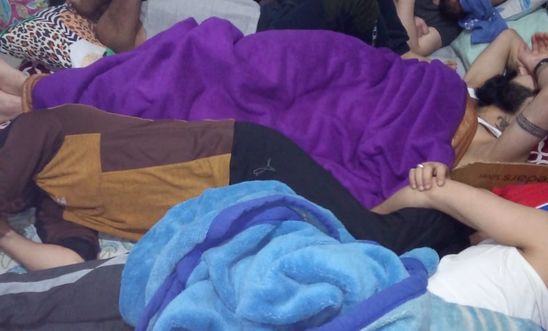
Press releases
Lebanon: Thousands of prisoners held in 'revolting' conditions at risk of COVID-19

Some detainees reportedly held in overcrowded jails without trial for at least 13 years
Prisoners sprayed with water and Dettol to supposedly help protect them from the virus
‘Lebanon’s prisons are full of people who simply should not be there’ - Lynn Maalouf
The Lebanese authorities are holding prisoners in overcrowded cells who have served their sentences despite the deadly risk from the COVID-19 virus, Amnesty International warned today.
Despite the Government’s release of 600 prisoners in pre-trial detention as part of its emergency response to the pandemic, Amnesty is concerned that thousands of individuals awaiting trial or having already finished serving their sentences remain in detention.
Lynn Maalouf, Amnesty International’s Middle East Research Director, said:
“Lebanon’s prisons are full of people who simply should not be there, including hundreds of individuals who remain behind bars because the judiciary isn’t processing their case in a timely manner or because they are unable to pay their fines or secure release warrants.
“The authorities’ COVID-19 response is an opportunity to address this lingering injustice and must no longer be delayed.
“For those who remain in detention or prison, the Lebanese government must provide a standard of health that meets each person’s individual needs and ensures the maximum possible protection against the spread of COVID-19.”
Amnesty is calling on the Lebanese authorities to release prisoners who have finished their sentences, and those serving sentences or detained on charges that are not internationally recognised crimes. Amnesty is also urging the Lebanese authorities to seriously consider releasing or adopting non-custodial measures for those who are imprisoned pending trial, as well as those who are at particular risk because of their age or underlying health conditions, regardless of the charge they have been detained or convicted under.
Some detainees held without trial for 13 years
On 6 April, the Lebanese Ministry of Interior announced the release of more than 600 prisoners who had been in pre-trial detention, as part of the Government’s measures to contain the spread of COVID-19.
According to the Lebanese non-governmental organisation the Legal Agenda, the occupancy rate across prisons was at 130% in 2018, mainly due to lengthy periods of pre-trial detention. Detention conditions remain dire - with persistent overcrowding and inadequate conditions, while hundreds of prisoners suffer from critical health conditions.
On 17 March, the Lebanese government submitted a draft law to Parliament that would have exempted prisoners who had finished serving their prison sentences from paying their fines, granting them release. However, the parliamentary agenda for this week’s three-day legislative session did not include the draft law.
Doummar El-Mokdad, from the Committee of the Families of Prisoners in Lebanon, told Amnesty that he was aware of pre-trial detainees who had been held for very extended periods of time. He said:
“Prisoners are left without trials. Some prisoners have been incarcerated since the events of Nahr El Bared in 2007, and have remained for 13 years without trial. These are hostages, not prisoners. For prisoners and their families, Lebanon is a living hell. Our prisons are not made for human beings. Photos and videos sent by prisoners show that their conditions remain revolting.”
El-Mokdad told Amnesty that around 120 prisoners use the same bathroom in Roumieh, and that 70 inmates sleep in each corridor. In Zahle Prison, there are an estimated 820 inmates in a 300-person capacity building.
Hundreds of prisoners with respiratory conditions
Relatives interviewed by Amnesty described how they fear for prisoners’ health in light of COVID-19, especially as visits are becoming increasingly difficult due to restrictions imposed because of the pandemic.
According to Omar Nashabe, a former advisor to the Ministry of Interior, the administration of Roumieh Central Prison provided a list of 700 prisoners with underlying medical conditions, with many suffering from respiratory issues and other conditions putting them at higher risk from COVID-19.
Heba Al-Mawla’s husband Ali has so far served seven years of a 13-year sentence for selling drugs. A mother of two, she has been unable to visit him for three weeks because her work as a taxi driver has stopped and she has no funds.
She said:
“Ali told me they gathered the prisoners and sprayed them with water and Dettol inside. Is this a valid measure to protect them from coronavirus? Or just another measure to disrespect them? When they sentence someone to such a long time in prison, they’re also sentencing his mother, wife and kids. Our country is full of injustice”.